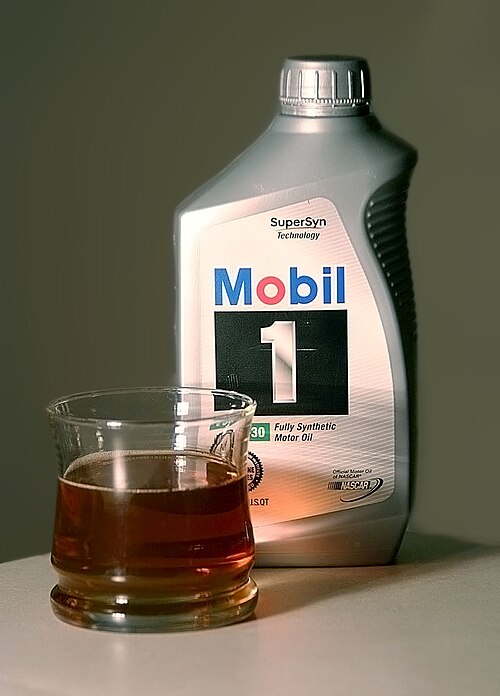Oilnoun
Liquid fat.
Oilnoun
Petroleum-based liquid used as fuel or lubricant.
Oilnoun
An oil painting.
Oilverb
(transitive) To lubricate with oil.
Oilverb
(transitive) To grease with oil for cooking.
Oilnoun
Any one of a great variety of unctuous combustible substances, more viscous than and not miscible with water; as, olive oil, whale oil, rock oil, etc. They are of animal, vegetable, or mineral origin and of varied composition, and they are variously used for food, for solvents, for anointing, lubrication, illumination, etc. By extension, any substance of an oily consistency; as, oil of vitriol.
Oilverb
To smear or rub over with oil; to lubricate with oil; to anoint with oil.
Oilnoun
a slippery or viscous liquid or liquefiable substance not miscible with water
Oilnoun
oil paint used by an artist
Oilnoun
any of a group of liquid edible fats that are obtained from plants
Oilverb
cover with oil, as if by rubbing;
Oilverb
administer an oil or ointment to ; often in a religious ceremony of blessing
Oilnoun
a viscous liquid derived from petroleum, especially for use as a fuel or lubricant.
Oilnoun
petroleum
Oilnoun
any of various viscous liquids which are insoluble in water but soluble in organic solvents and are obtained from animals or plants
Oilnoun
a liquid preparation used on the hair or skin as a cosmetic
Oilnoun
any of a group of natural esters of glycerol and various fatty acids, which are liquid at room temperature.
Oilnoun
oil paint
Oilnoun
an oil painting
Oilnoun
information or facts
Oilverb
lubricate, coat, or impregnate with oil
Oilverb
supply with oil as fuel
Oil
An oil is any nonpolar chemical substance that is a viscous liquid at ambient temperatures and is both hydrophobic (does not mix with water, literally ) and lipophilic (mixes with other oils, literally ). Oils have a high carbon and hydrogen content and are usually flammable and surface active.
Lipidnoun
(organic compound) any of a group of organic compounds including the fats, oils, waxes, sterols, and triglycerides. Lipids are characterized by being insoluble in water, and account for most of the fat present in the human body. They are, however, soluble in nonpolar organic solvents
Lipidnoun
Any of a variety of oily or greasy organic compounds found as major structural components of living cells; they are insoluble in water but soluble in organic solvents such as alcohol and ether, and include the common fats, cholesterol and other steroids, phospholipids, sphingolipids, waxes, and fatty acids; some of the lipids, together with proteins and carbohydrates, form an essential structural component of living cells, as in the cell walls and membranes. The term lipid refers to its solubility in nonpolar solvents, and has no significance with regard to chemical structure.
Lipidnoun
an oily organic compound insoluble in water but soluble in organic solvents; essential structural component of living cells (along with proteins and carbohydrates)
Lipidnoun
any of a class of organic compounds that are fatty acids or their derivatives and are insoluble in water but soluble in organic solvents. They include many natural oils, waxes, and steroids.
Lipid
In biology and biochemistry, a lipid is a micro biomolecule that is soluble in nonpolar solvents. Non-polar solvents are typically hydrocarbons used to dissolve other naturally occurring hydrocarbon lipid molecules that do not (or do not easily) dissolve in water, including fatty acids, waxes, sterols, fat-soluble vitamins (such as vitamins A, D, E, and K), monoglycerides, diglycerides, triglycerides, and phospholipids.







